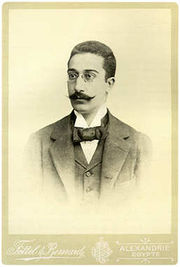 For some reason, I've always felt odd with C.P. Cavafy's most anthologized poem "Waiting for the Barbarians," or rather, with its translation. Of course, I do not speak Greek, but there is something odd in the poem. For example:
For some reason, I've always felt odd with C.P. Cavafy's most anthologized poem "Waiting for the Barbarians," or rather, with its translation. Of course, I do not speak Greek, but there is something odd in the poem. For example:Why have our two consuls and the praetors come outWhat bugs me is the use of Latin functions ("consuls," "praetors" and "togas") followed by typically Byzantine (or Greek) imagery.
today in their red, embroidered togas;
why do they wear amethyst-studded bracelets,
and rings with brilliant, glittering emeralds
I wonder if the use of Latin terms comes from a mistranslation or if Cavafy actually used them.
From Wikipedia:
The Byzantines identified themselves as Romans (Ρωμαίοι - Romaioi) and by the 7th century had already become a synonym for a "Hellene" (Έλλην, Greek) and more than ever before were developing a national consciousness as residents of Ρωμανία (Rōmania, as the Byzantine state and its world were called).Certainly, the Byzantine Empire was the historic successor of the Roman Empire, but so was the Frank Empire of Charlemagne. And after four centuries of cultural isolation and theological differences, the Western religious experience had grown quite differently from the Eastern one (this being before the Great Schism).
A history student friend of mine had previously argued that ultimately, the Greek experience was more of an Oriental one than a Western one (following a short discussion on Edward Said, although we were speaking of Ancient Greece, rather than the Byzantine Empire), evidenced, for example, by the failed marriage attempt between Charlemagne and Irene. And this chasm was probably exacerbated by the Ottoman annexation.
But does this (hypothetical) mistranslation attempt to reposition Greek poetry within a Western frame, the way Fitzgerald's translation of the Rubaiyat does with Medieval Persian poetry?
Yes, I am totally talking out of my ass ...
Re-reading Juliana Spahr's Fuck You-Aloha-I Love You, Michael Palmer's Company of Moths and Paul Celan's Selections (ed. Pierre Joris), listening to Ben Harper's Both Sides of the Gun, watching my mind drift as I spend too much time on Wikipedia ...
Comments
I think they were just as 'in between' as anybody was- between east and west!
I didn't know John considered this point. I was kinda hoping he'd bring his point of view there.
But from the discussions I've had, I agree the Byzantines were in between West and East, which is what makes me think they were more Oriental than we give them credit for.